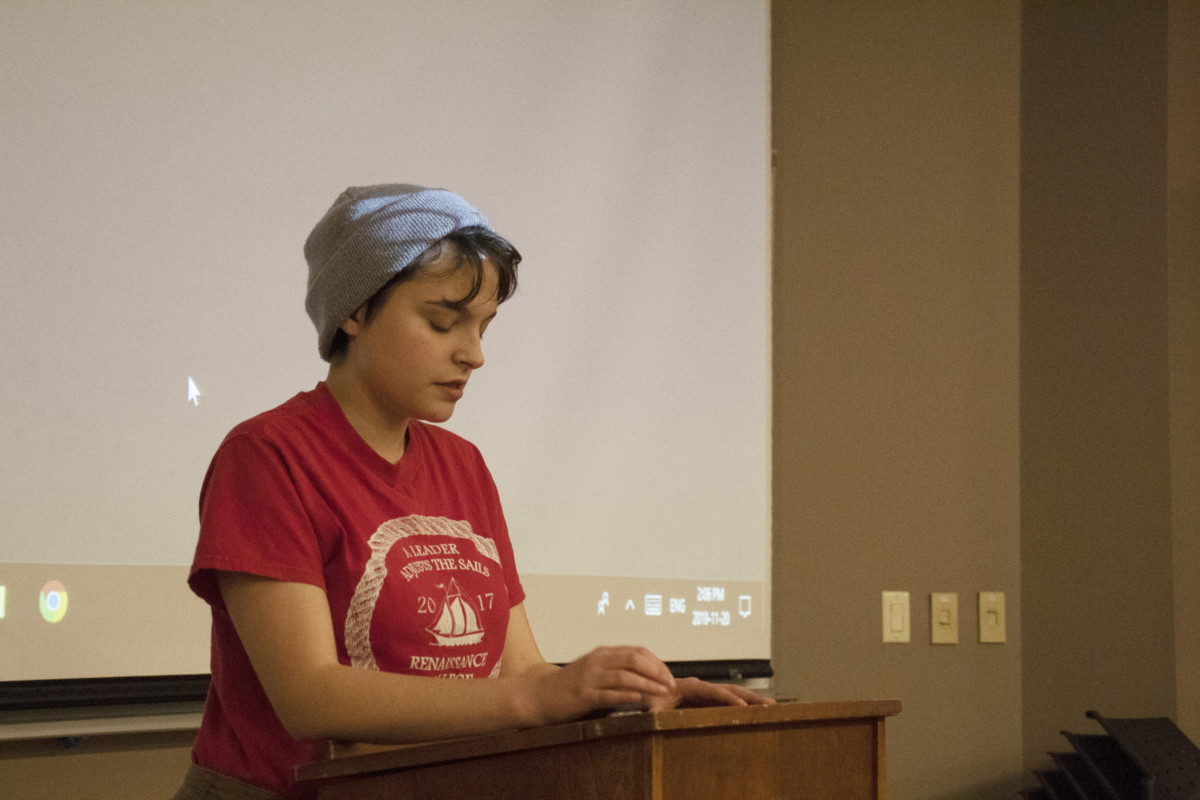Transgender people from around the world who have been killed were honoured with a slideshow of their names, age and country of origin for the on-campus Transgender Day of Remembrance service. A separate service was held at the Charlotte Street Arts Centre later in the day.
University of New Brunswick coordinator of The 203 Centre for Gender and Sexual Diversity Grace Taylor said while there were few Canadians on the honour list, they stressed the importance of honouring all of the lost lives.
“We are far from being untouched by these tragedies. Each loss of life is a massive blow to our community; each person lost [is] a tragedy,” said Taylor.
“All of us, as Canadians, can do better to combat anti-transgender violence in our communities.”
Transgender Day of Remembrance began in 1999 as a day to memorialize murder victims of transphobia. It began as a web-based project by transgender activist, Gwendolyn Smith in Allston, Massachusetts.
The event was organized by The 203 Centre for Gender and Sexual Diversity, in partnership with Qmunity.
The slides were projected for an audience in UNB’s MacLaggan Hall on Nov. 20. Over a dozen people in attendance heard from three keynote speakers from St. Thomas University and UNB.
Taylor said within the last year roughly 331 transgender people have been lost to violence globally, bringing the total number of victims to 3314 over 11 years.

The numbers have been tracked each year by the Transgender Murder Monitoring Project since July 2009.
Based on the latest report from the Human Rights Campaign in the United States, at least 22 people have been murdered this year for being gender non-conforming or transgender. All but one was a person of colour.
Those in attendance took part in a minute of silence before hearing from AJ Ripley, a human rights professor at STU, and Tyler MaGee, the sexuality and gender diversity representative for St. Thomas University’s Students’ Union.
Ripley, who is non-binary, said in their speech that transgender and gender diverse people share one thing in common.
“Trans and gender diverse people are made to remember, never allowed to forget, that we are simultaneously too much and not enough for most people,” said Ripley.
Ripley said gender-diverse people live with constant harassment and bullying, both online and on the street. In public situations, they may be referred to by a name or pronoun with which they no longer identify.
MaGee said as allies for the transgender community, it’s crucial to stand up for those around the world.
“We all have a responsibility as human beings to stand up to this violence, to never accept discrimination, to not become desensitized to violence against any group and to never forget that we are all human.” 
Taylor, the internal coordinator at the 203, said the day means a lot in their life because it hits close to home.
“This day, I would say, means the same as every other day of the year because this is always on my mind,” they said.
“This is the kind of remembering [trans people] do all the time, we’re forced to. I’ve personally lost people in my life to hate.”
Later that evening, another ceremony was held at the Charlotte Street Arts Centre, hosted by the group Fredericton Gender Minorities. Over 30 people attended the public service.
The main speaker was Quinn Bateman, a Fredericton Gender Minorities member and event organizer. In their speech, they discuss how, in times of hardship, it’s crucial to build community and value each other.
“While transgender people have made great strides and visibility over the past few years, it’s important to remember that visibility does not necessarily equal safety,” Bateman said.
Former Gender Minorities member and emcee Nat Armstrong said the struggles transgender people face are prevalent in Fredericton, from accessing healthcare to being harassed or accosted in the street.
“As a visibly trans person, I don’t think a week goes by where someone doesn’t comment on my appearance or something like that,” said Armstrong.
Armstrong said it’s crucial to promote community between cis-gendered allies and members of the transgender, non-binary and two-spirited communities.
“We shouldn’t have to wait until Nov. 20 each year to celebrate our resilience, our vibrancy, our creativity, find joy and strengthen each other.”

